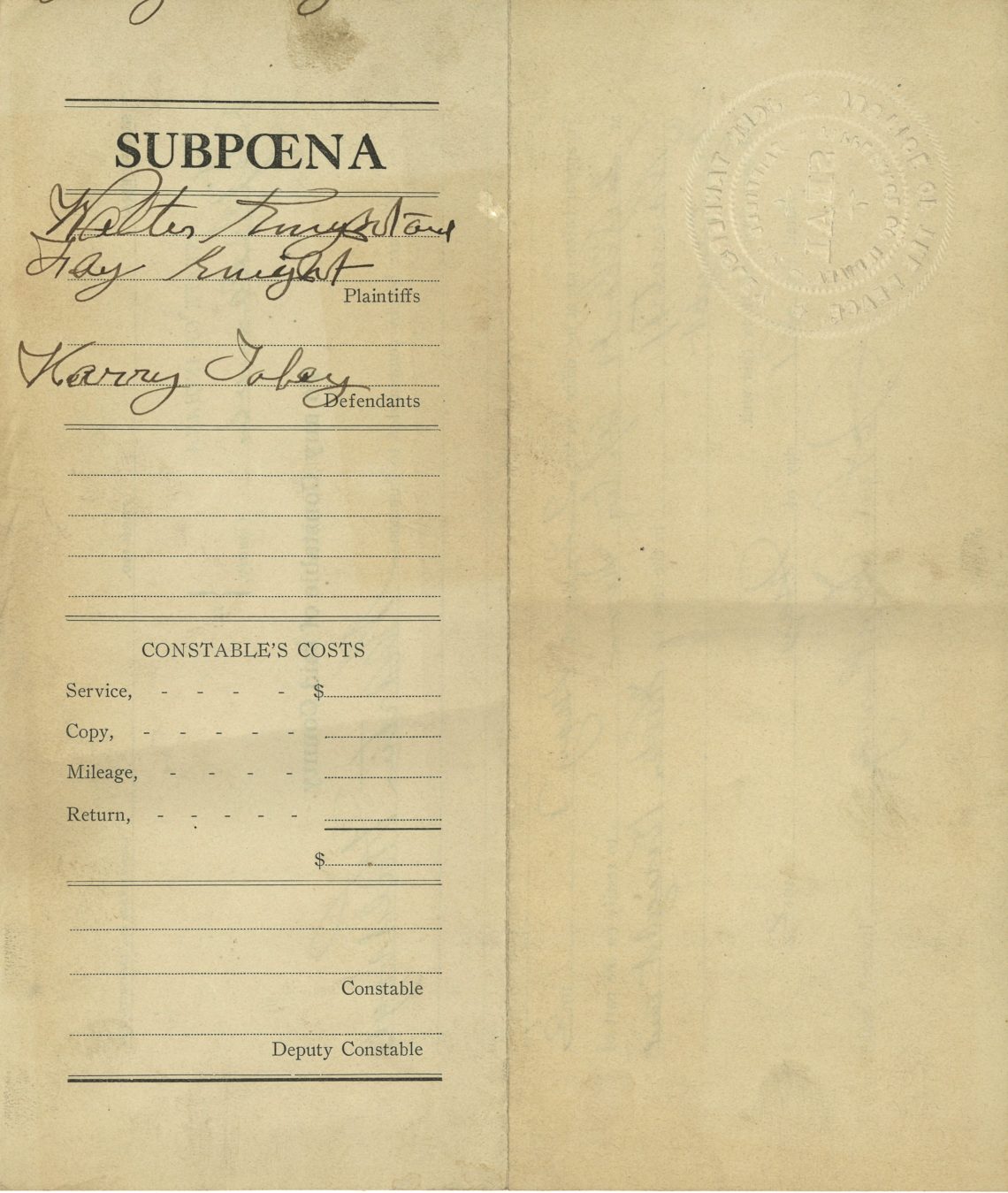A will caveat is a special proceeding in which parties can challenge the validity of a document purporting to be the last will and testament of the decedent. The question to be answered is whether the purported will is valid. As a result, admissible evidence and potential remedies are limited to a determination of that question. Initiating Steps A caveat proceeding is initiated when an individual (the “decedent”) dies, leaving behind a document purporting to be his or her will. The purported will is submitted to the clerk of court to be probated. Any interested party – any party with a pecuniary or beneficiary interest in the decedent’s…
-
-
THIRD PARTY BENEFICIARIES TO CONTRACTS
ABC Seller agrees to sell 100 widgets to XYZ Buyer for $10 per widget. This agreement creates a contract, which largely governs the rights and obligations of ABC Seller and XYZ Buyer. However, contracts such as this often impact additional entities or individuals beyond the parties themselves. For example, ABC Seller may need to contract with a manufacturer, who in turn may need to contract with components manufacturers, to honor XYZ Buyer’s order. ABC Seller and/or XYZ Buyer may need to contract with a shipping company to deliver the widgets. To the extent XYZ is selling the widgets to an end user, the end user will also benefit from the…
-
TORTIOUS INTERFERENCE WITH CONTRACT
Last week, Lindley Law discussed the elements of tortious interference with expected inheritance, which can occur when an individual maliciously interferes with the making or revocation of a will to the detriment of the plaintiff. This blog will address a similar but distinct tort: tortious interference with contract. The Elements In North Carolina, to prove tortious interference with expected inheritance, a plaintiff must allege: A valid contract existed between the plaintiff and a third party, which conferred contractual rights upon the plaintiff against the third party; The defendant had actual knowledge of the contract between the plaintiff and the third party; The defendant intentionally induced the third…
-
TORTIOUS INTERFERENCE WITH EXPECTED INHERITANCE
North Carolina recognizes a cause of action for tortious inference with expected inheritance. This cause of action can be confused with tortious interference with prospective economic advantage, which occurs in the context of a contract or potential contract. Conversely, tortious interference with expected inheritance occurs in the context of a will or estate, rather than in the context of a contract or potential contract. Further, unlike a cause of action for undue influence, which permits recovery by the testator (the person executing the will), tortious interference with expected inheritance permits recovery by the individual expecting to benefit from the testator’s will. The Elements To prove tortious interference with…
-
“ROBOCALLS” AND THE FIRST AMENDMENT: A LEGISLATIVE UPDATE
In a recent blog post, Lindley Law discussed the Fourth Circuit Court of Appeals ruling in Ameican Association of Political Consultants, Inc. v. FCC, which addressed First Amendment questions regarding the regulation of “robocalls” related to debt collection for government-backed loans. The United States Congress recently announced proposed legislation to combat the practice of robocalling: the Pallone-Thune TRACED Act (the “TRACED Act”). The Proposed Legislation The TRACED Act will combine and reconcile the Telephone Robocall Abuse Criminal Enforcement and Deterrence Act, which passed in the Senate in May, with the Stopping Bad Robocalls Act, which passed in the House of Representatives in July. The separate bills created new…
-
DISINHERITED SPOUSES AND THE RIGHT OF ELECTIVE SHARE
Ric Ocasek, famed singer for The Cars, recently passed away leaving behind a will that purportedly removes his estranged wife, Paulina Porizkova, as a beneficiary of his estate. Ocasek and Porizkova were in the process of divorcing when Ocasek died; however, the divorce was not finalized, and the two were still legally married. Removing one’s spouse from an estate plan – often referred to as disinheriting a spouse – is common, particularly when spouses are separating and divorcing. States that have adopted the Uniform Probate Code, or similar statutes, create protection for a disinherited spouse in the form of the right of elective share. What is Elective Share? …
-
WHAT IS THE SERVICEMEMBERS CIVIL RELIEF ACT?
In honor of the upcoming Veterans Day holiday, this blog post will discuss the Servicemembers Civil Relief Act (the “SCRA”), which provides specific protections for those in active duty military service, as well as their dependents. The SCRA’s Specified Protections The SCRA was enacted in 2003 and recognizes that those in active duty military service may not be able to participate in certain civil affairs, and creates certain protections for those who qualify. Default judgment protection. In order to obtain a default judgment against a defendant who failed to make an appearance in the proceeding, the plaintiff must file an affidavit certifying whether or not the defendant…
-
EPIC GAMES EMPLOYEE ALLEGEDLY LEAKS EPICLY SECRET DETAILS ABOUT FORTNITE CHAPTER 2
North Carolina-based Epic Games filed a lawsuit over the alleged leak of secret information related to Fortnite Chapter 2. The company claims employee Ronald Sykes violated the terms of a non-disclosure agreement by sharing information related to the new game, including new game-play features and a virtual map of the fictional game universe, prior to its public release. The success of Epic Games’ claims will primarily hinge on whether the non-disclosure agreement is enforceable and whether the allegedly leaked information constituted protected trade secrets. Non-Disclosure Agreements A non-disclosure agreement (“NDA”) is a contract, or part of a contract, that prohibits one or more parties from disclosing certain confidential…
-
DO I NEED TO RESPOND TO THIS SUBPOENA?
A subpoena is a very useful tool for gathering information in civil litigation. They are also used in other contexts, such as by the United States Congress (for example, the congressional subpoena issued to Rudy Giuliani). A civil subpoena is a document provided to an individual or entity compelling that individual or entity to do something – either to testify or to provide documents or other forms of evidence. In North Carolina, the form and function of a subpoena is explained in Rule 45 of the North Carolina Rules of Civil Procedure. Form and Service: What Should My Subpoena Look Like and How Do I Need to Serve It…
-
DUKE’S MAYONNAISE TRADEMARK DISPUTE
Duke’s Mayonnaise can trace its roots to 1917 in Greenville, South Carolina. Founder Eugenia Duke developed a recipe for mayonnaise to add to sandwiches she sold to soldiers fighting in World War I. Eventually, the sandwich shop became an independent business – the Duke Sandwich Company – and Duke’s mayonnaise continued to be produced by new owner C.F. Sauer Company. Nearly 100 years later, C.F. Sauer Company is suing Duke Sandwich Company over alleged trademark infringement and trademark dilution. C.F. Sauer’s lawsuit claims other causes of action, including unfair competition, which fall outside of the scope of this article. A Foundation in Trademark Law The Lanham Act protects…








